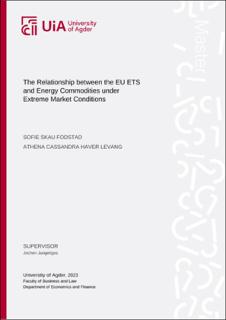| dc.description.abstract | Climate change is becoming a more and more severe problem. Over many years, governments and organizations have introduced and proposed several measures to limit global warming. One of which is the Kyoto Protocol which was introduced by the UN as a measure to limit greenhouse gas emissions by introducing carbon trading. Carbon trading is a concept where those responsible for the emissions pay the price of their negative impact on climate. Fossil fuels, i.e., oil, gas, and coal are commodities that heavily influence the climate negatively. Therefore, this thesis aims to research the relationship between the returns of European Union Allowances and the returns of energy commodities under extreme market conditions. Employing quantile regression method, we study these relationships at different quantile levels. Through our research we found that there is a significant relationship between the variables, but that the relationship varies across different quantile levels. In addition, results differ when conducting the analyses with each commodity separately against carbon returns, then when all energy commodities are included. Overall, our thesis findings contribute to the existing literature regarding the relationship between carbon and energy markets under extreme market conditions. | |
